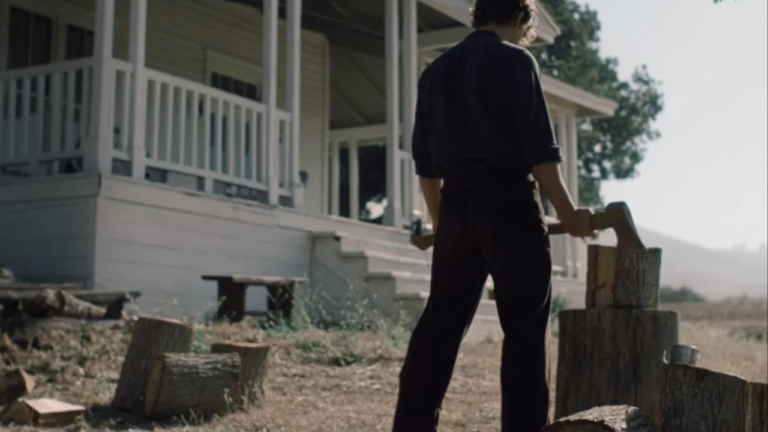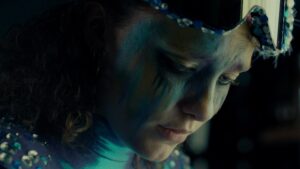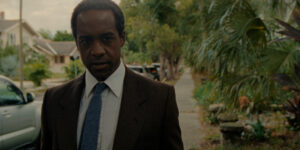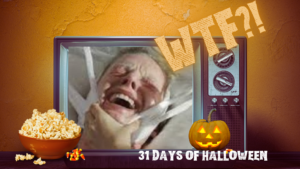After crossing the Atlantic ocean with his wife and two sons, Abraham Van Helsing has finally settled down… or has he?
Let me point this out; has anyone ever considered fact-checking Van Helsing? Did anyone ask him for true vampiric evidence? Maybe not. Natasha Kermani (Lucky, V/H/S/85) helms the feature film adaptation of Abraham’s Boys; Joe Hill’s short story continuation of the Bram Stoker vampire classic.
A Familiar Family Crisis
Titus Welliver stars as Dr. Abraham Van Helsing. In a new perspective, the character is highlighted as formidable as a father figure can be, by telling a story of the true horrors inside the home. The film takes place in an isolated, single location- a desert ranch somewhere in California. The setting is said to be untouchable by vampiric forces in hopes of keeping the Van Helsing family safe. Hypothetically, this should work, unless the evil is already in route.
His wife, Mina Van Helsing, suddenly falls ill. This triggers an intense comeback of Abraham’s traumas by way of vampirism, as she is one of the lucky few who are “sensitive” to occult forces, leaving her vulnerable to possession. From Abraham’s perspective, there is no reasoning for her illness other than the new expansions of railroads nearby, leading the evil of the world straight to the family’s front porch. With the knowledge and experience he’s gained after Dracula back in Europe, Abraham feels he has no other choice but to act to protect his family. Having never witnessed true vampirism, it’s difficult for the boys to get on board with the panic.
Think Of The Children
Inherited trauma and grooming are the names of the game from the eyes of his two young boys, Rudy (Judah Mackey) and Max (Brady Hepner). Where there’s a family study, the youth are guaranteed to snoop around. What Max and Rudy find is what we already know about Van Helsing’s past career. Although, viewers haven’t had the option to question its legitimacy just yet. We’re lucky we don’t have to inherit it, but the boys’ introduction to the occult jumpstarts a familial nightmare after questioning the ethics of their father’s research and his overprotection of their mother.
What’s interesting about this continuation is the source of horror. Abraham’s Boys is barely a vampire story, but that doesn’t necessarily mean what you’ll witness won’t disturb you. Domestic abuse comes in many forms. Just because it’s not intentional, does not mean that delusion can’t be paired with malice. Fear-mongering is a dangerous drug, especially in isolation, and when your subjects are young enough to groom by word of mouth alone.
Abraham’s Boys Could Make Some More Noise
Titus Welliver’s turn as Abraham Van Helsing is perfect, and his performance is amplified by the cinematic angles he’s captured in, especially in 4:3 aspect ratio. His dialogue is that of a seasoned, worldly man whose word you can trust, and his deep and slow delivery echoes that of a man you’ve got to fear. His counterpart, Mina, played by Jocelyn Donahue, is the perfect balance to it. Her character is soft and loving but clearly a little off. The mystery agent in her performance and behavior, mixed with the strength and confidence of her on-screen husband, create a home that’s clearly a ripe breeding spot for fear-mongering. Paranoia is all over the walls, which is super effective. However, more movement or higher stakes could definitely benefit the crawling pace in the first two acts.
Most of the runtime focuses on establishing this type of socially dangerous atmosphere to the viewer through dialogue, its delivery, and the visual eye they are captured in. Believe me, it’s slow, but note that even though the horrors of Abraham’s Boys are based in reality, the film’s third act is spiked with blood and violence. Selfishly, I wish there was a bit more in the send-off. However, Kermani’s final product of 1900s world and character building is visually delicious.
Abraham’s Boys had it’s world premiere at Overlook Film Festival.






